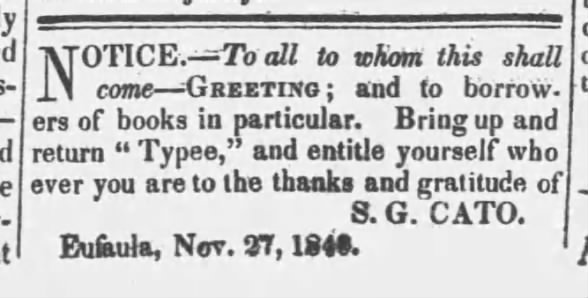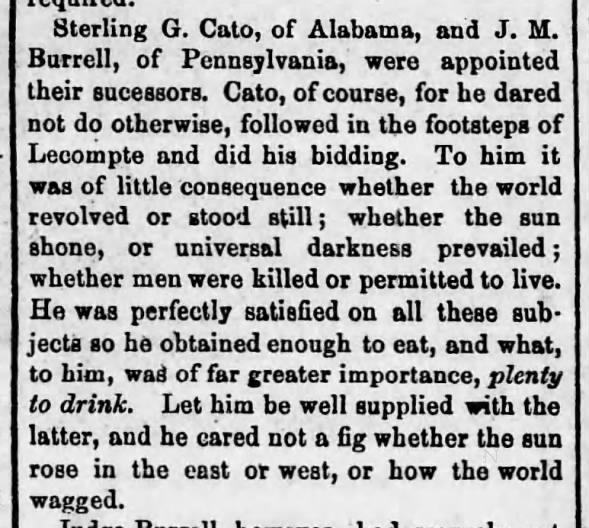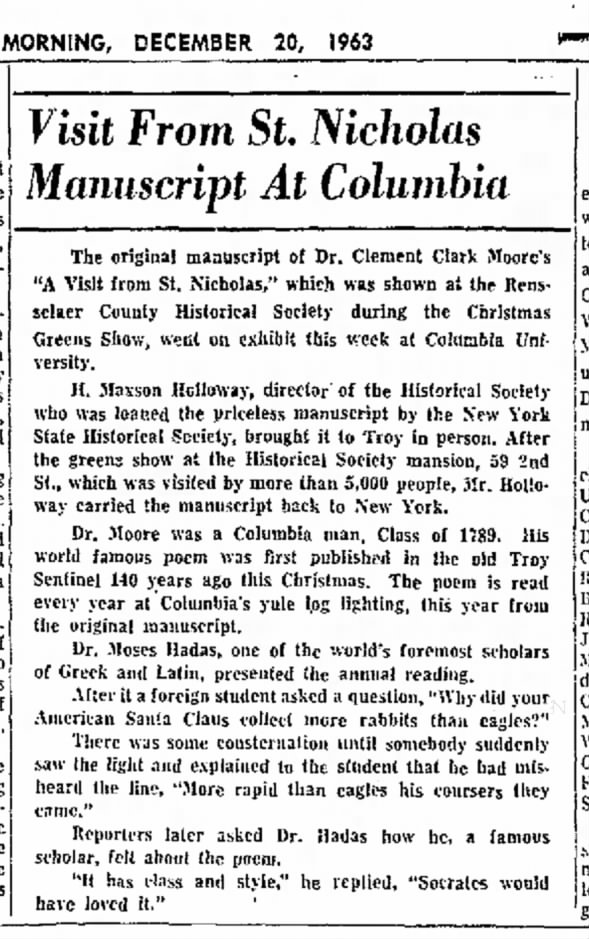 |
| Detail of Sir Robert Peel, 2nd Bt, by Henry William Pickersgill |
As revealed in Gansevoort Melville's 1846 London Journal, edited by Hershel Parker (New York Public Library, 1966), Herman Melville's older brother wrote many letters home to family members and friends including Edwin Croswell, editor of the Albany Argus. Gansevoort Melville's letters to Croswell evidently supplied material for at least one article of London news in the Argus during the first months of 1846.
On March 24, 1846, the Albany Argus published "extracts from a letter from an American gentleman, in London, whose position and character, give weight to his opinions." Although unnamed in print, the "American gentleman" was surely editor Croswell's friend Gansevoort Melville, then employed in the authoritative "position" of Secretary to the American Legation in London. The letter excerpted in the Argus is dated March 2, 1846. On March 4th Gansevoort had sent 13 letters by steamer including one to Croswell (1846 London Journal page 63, 45-46 in Parker's edition).
As noted in his journal (February 3, 1846), Gansevoort had sent Lemuel Shaw and others printed copies of the prime minister's speech on repeal of the Corn Laws, which Gansevoort called "Sir Robt Peel's great speech on his scheme of commercial policy." (On the same day, Gansevoort also sent one "long letter," now lost, to his brother Herman Melville, and others to New York friends about Typee.) Gansevoort's journal entry for February 9th records his witnessing the House of Commons debate on "Sir Robert Peel's scheme of commercial policy." Gansevoort's repeated phrase, "scheme of commercial policy," is also used by Edwin Croswell's "American gentleman" in connection with ongoing debates that Gansevoort had personally witnessed in visits to both Houses of the British Parliament.
Gansevoort often saw Louis McClane, the American Minister to Great Britain, when McLane was ill and bedridden. On February 19th Gansevoort observed that "Mr. McLane sat up to-day for the first time in 9 or 10 days." Gansevoort found him "gradually improving in health" on February 24th, but "still feeble" on March 2, 1846, the date of the letter from Croswell's "American gentleman" describing McLane as "now better, but much enfeebled."
Like Gansevoort Melville, the American gentleman in London had been "recently at Court." Gansevoort's journal entry for January 22nd depicts Queen Victoria as "very short fat & bloated in the face & neck." Gansevoort's private impression or something to that effect is implied in the superficially kinder assurance by Croswell's London correspondent that "The Queen is much flattered by all the pictures of her which I have seen." (Parker notes that "Victoria's appearance probably owed something to her being several months pregnant.") The cleverly worded, implied comparison of the Queen's actual appearance to flattering portraits was deleted when the Argus column was reprinted in the Washington Daily Union on March 25, 1846.
The final paragraph in the quoted letter from Croswell's "American gentleman" conveys the essential matter of Gansevoort's journal entry on February 16, 1846:
AMERICAN GENTLEMAN
On March 24, 1846, the Albany Argus published "extracts from a letter from an American gentleman, in London, whose position and character, give weight to his opinions." Although unnamed in print, the "American gentleman" was surely editor Croswell's friend Gansevoort Melville, then employed in the authoritative "position" of Secretary to the American Legation in London. The letter excerpted in the Argus is dated March 2, 1846. On March 4th Gansevoort had sent 13 letters by steamer including one to Croswell (1846 London Journal page 63, 45-46 in Parker's edition).
As noted in his journal (February 3, 1846), Gansevoort had sent Lemuel Shaw and others printed copies of the prime minister's speech on repeal of the Corn Laws, which Gansevoort called "Sir Robt Peel's great speech on his scheme of commercial policy." (On the same day, Gansevoort also sent one "long letter," now lost, to his brother Herman Melville, and others to New York friends about Typee.) Gansevoort's journal entry for February 9th records his witnessing the House of Commons debate on "Sir Robert Peel's scheme of commercial policy." Gansevoort's repeated phrase, "scheme of commercial policy," is also used by Edwin Croswell's "American gentleman" in connection with ongoing debates that Gansevoort had personally witnessed in visits to both Houses of the British Parliament.
Gansevoort often saw Louis McClane, the American Minister to Great Britain, when McLane was ill and bedridden. On February 19th Gansevoort observed that "Mr. McLane sat up to-day for the first time in 9 or 10 days." Gansevoort found him "gradually improving in health" on February 24th, but "still feeble" on March 2, 1846, the date of the letter from Croswell's "American gentleman" describing McLane as "now better, but much enfeebled."
Like Gansevoort Melville, the American gentleman in London had been "recently at Court." Gansevoort's journal entry for January 22nd depicts Queen Victoria as "very short fat & bloated in the face & neck." Gansevoort's private impression or something to that effect is implied in the superficially kinder assurance by Croswell's London correspondent that "The Queen is much flattered by all the pictures of her which I have seen." (Parker notes that "Victoria's appearance probably owed something to her being several months pregnant.") The cleverly worded, implied comparison of the Queen's actual appearance to flattering portraits was deleted when the Argus column was reprinted in the Washington Daily Union on March 25, 1846.
The final paragraph in the quoted letter from Croswell's "American gentleman" conveys the essential matter of Gansevoort's journal entry on February 16, 1846:
AMERICAN GENTLEMAN
"Mr. WHEATON has been here. He will return to the U. S. in May, and expects to be succeeded by Major DONELSON, who is a sound, judicious man."GANSEVOORT MELVILLE
9-- about 9 we left. I saw Mr Wheaton home--bade him good bye. He tells me that he will return home in May. A J Donelson is to succeed him -- a good appointment.
--Gansevoort Melville's 1846 London Journal, page 39 in Hershel Parker's edition.Elsewhere in the 1846 journal Gansevoort describes Henry Wheaton, the retiring U. S. minister to Prussia, as "a cold selfish, and somewhat sordid man." Wheaton's better-liked successor is the subject of a recent biography by Richard Douglas Spence, Andrew Jackson Donelson: Jacksonian and Unionist (Vanderbilt University Press, 2017).
 |
| Albany Argus - March 24, 1846 via GenealogyBank |
FROM LONDON -- REPEAL OF THE CORN LAWS, &c.
The following are extracts from a letter from an American gentleman, in London, whose position and character, give weight to his opinions:
LONDON, March 2, 1846.
"The intense interest felt in the fate of Sir ROBERT PEEL'S great scheme of commercial policy, has for the last few weeks overshadowed the Oregon question in the attention of the public; but now that the triumphant majority of 97 in the Commons has declared itself in favor of the measure as submitted, it is generally conceded that the Lords will not dare to offer serious opposition to its passage through the House, and the large number who take this view of the case consider the Corn Laws virtually repealed by the heavy majority in favor of their demolition in the more popular and powerful branch of the national legislature. I have been present frequently during the debate, and have had the advantage of hearing, on a great topic, nearly all the first political names of England. The successful accomplishment of this great revolutionary movement, is, in my humble view, more a tribute to the power of popular agitation and a concession to the necessity of the case, than a homage to the principles of Free Trade.
"Sir ROBERT PEEL looks pale and careworn.-- He and the Home Secretary, Sir JAMES GRAHAM, were compelled, during a protracted debate of twelve nights, to endure a kind of political martyrdom. Their speeches, their pledges, the promises on which they obtained office, were all cast into their teeth. HANSARD [reports] was ransacked to delectate their ears with their own staunch arguments for the validity of principles, which are now sought to be overturned, not temporarily but for ever, by the very men who rode into power, as all believed, for the express purpose of maintaining inviolate that which they now will themselves destroy.
"Mr. McLANE has been very sick, and for 10 or 11 days was confined to his bed. He is now better, but much enfeebled in body by the severity of the attack to which he has been exposed. I was recently at Court. The Queen is much flattered by all the pictures of her which I have seen. As a spectacle, the coup d'oell [coup d'oeil] was magnificent.
"Mr. WHEATON has been here. He will return to the U. S. in May, and expects to be succeeded by Major DONELSON, who is a sound, judicious man."
-- Albany Argus, March 24, 1846. Reprinted in the Madison Observer (Morrisville, New York) on March 25, 1846; and the Washington Daily Union, also on March 25, 1846.The Washington Daily Union censored Gansevoort's impolite allusion to the Queen's personal appearance:
 |
| Washington [D. C.] Daily Union - March 25, 1846 |
"Mr. McLane has been very sick, and for ten or eleven days was confined to his bed. He is now better, but much enfeebled in body by the severity of the attack to which he has been exposed. I was recently at Court. As a spectacle, the coup d'oeil was magnificent."Alongside the latest from London, the March 24, 1846 issue of the Albany Argus printed news of the recent "Great Battle in India" with two different narratives by Sir Hugh Gough as Commander-in-Chief, India. Most likely, these accounts were also supplied by Gansevoort Melville. On February 24, 1846 Gansevoort
"wrote Mr Croswell a short letter on the war with the Sikhs accompanying papers contg the late intelligence of Sir Hugh Gough's two battles this side the Sutlej."
--Gansevoort Melville's 1846 London Journal, page 42 in Parker's edition.
 |
| Edwin Croswell Brady-Handy photograph collection, Library of Congress |







